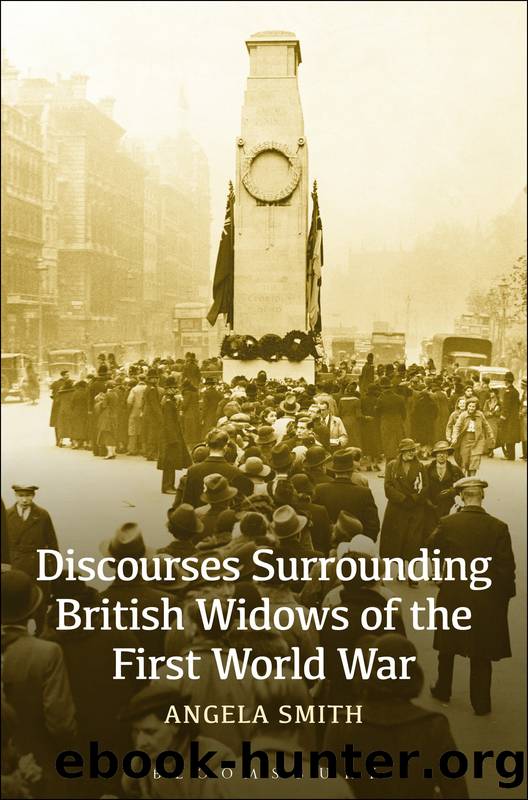Discourses Surrounding British Widows of the First World War by Smith Angela;

Author:Smith, Angela;
Language: eng
Format: epub
Publisher: Bloomsbury Publishing Plc
Published: 2013-08-15T00:00:00+00:00
Pension on the basis of need: âI canât live on airâ
As previously mentioned, the Royal Warrant had been drafted partly out of a desire to save money in the long-term, institutional care of destitute widows by preventing the potential future expense of workhouse accommodation whilst appearing to be beneficent and acting for the good of the nation. In this rush to appear fair and equal in the distribution of pension payments, there was no means-testing for a war widowâs pension; this was set at a flat rate on a scale depending on a number of factors, including the widowâs age.
In common with most working-class widows whose letters form the basis of this corpus, Louisaâs argument is often based around material needs. This links into older, more established and familiar discourses of means-tested allowances. In a letter20 dated by Louisa 27th December, 1919, she pleads:
Sir / I have gote a Bade Father to live with / he gainge to throwe me out is house bocose I cante Pay my longs money that ben fru to my Husband / Sir Could you Finde me something To do / I ham a War Widows / I gete know home to cauled my hone / No15900 Private Frank Bayliss 10 Gloucestershire Regiment WCB237.
Dear sir / I till Bade I cante work fore my self [â¦]
Here, her argument to regain her pension payment is supported by her need for accommodation. It appears that she is living with her father, but claims he is going to throw her out as she is unable to pay him any lodging money. She draws on the notion of the State as surrogate husband in pointing out that her husband had previously paid for her lodgings. Echoing the debates in parliament from six years previously, she highlights her fate as a destitute war widow without a home to call her own. She is also implying a willingness to go out and work, thus linking into the ideology of the Protestant work ethic which underpinned much 19th-century charitable provision and continued into 20dl-century social welfare legislation. In Louisaâs case, she pleads she is unable to work owing to ill-health (âI till Badeâ), a factor which is highlighted in other letters in her file.
In one of the first letters21 from Louisa herself (date-stamped 28th August, 1919), she requests her ring paper be reissued as she is only receiving a pension for Winnie.
Dear Sir / I ham Sendinge this letter to you if you wood forde this Ringe Papper down soon you can / I havent hade heny money week fore aught houlding fore my Little Girl / I cante mabed you out / Wood you be so kinge forde my Ringe Papper down as Well soon you cane / the Number the Ringe Papper is 237 / My Husband No 15900 Private Frank Bayliss 10 Battalion Gloucestershire Regiment / Dear Sir / I havente gote marrage not all / I ham a Widow / Wood you Please Sende me my Pensions money
Download
This site does not store any files on its server. We only index and link to content provided by other sites. Please contact the content providers to delete copyright contents if any and email us, we'll remove relevant links or contents immediately.
| Africa | Americas |
| Arctic & Antarctica | Asia |
| Australia & Oceania | Europe |
| Middle East | Russia |
| United States | World |
| Ancient Civilizations | Military |
| Historical Study & Educational Resources |
Room 212 by Kate Stewart(5105)
The Crown by Robert Lacey(4805)
Endurance: Shackleton's Incredible Voyage by Alfred Lansing(4768)
The Iron Duke by The Iron Duke(4349)
The Rape of Nanking by Iris Chang(4202)
Joan of Arc by Mary Gordon(4099)
Killing England by Bill O'Reilly(3995)
Say Nothing by Patrick Radden Keefe(3975)
I'll Give You the Sun by Jandy Nelson(3428)
Shadow of Night by Deborah Harkness(3356)
Hitler's Monsters by Eric Kurlander(3328)
Mary, Queen of Scots, and the Murder of Lord Darnley by Alison Weir(3200)
Blood and Sand by Alex Von Tunzelmann(3193)
Eleanor & Park by Rainbow Rowell(3151)
Darkest Hour by Anthony McCarten(3119)
Margaret Thatcher: The Autobiography by Thatcher Margaret(3078)
Book of Life by Deborah Harkness(2930)
Red Famine: Stalin's War on Ukraine by Anne Applebaum(2927)
The One Memory of Flora Banks by Emily Barr(2856)
